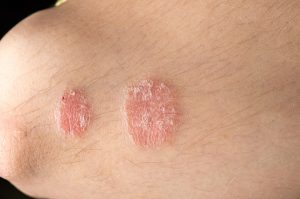 Psoriasis increases the risk of Crohn’s disease in women. Research revealed that women with psoriasis have a fourfold risk of developing Crohn’s disease, based on data from two large cohort studies. On the other hand, psoriasis did not increase the risk of ulcerative colitis in either cohort.
Psoriasis increases the risk of Crohn’s disease in women. Research revealed that women with psoriasis have a fourfold risk of developing Crohn’s disease, based on data from two large cohort studies. On the other hand, psoriasis did not increase the risk of ulcerative colitis in either cohort.
Reversing the association, an alternative study found a 13 percent psoriasis prevalence among patients with inflammatory bowel disease (IBD).
Advertisement
Researcher Abrar A. Qureshi said, “Certainly, this is a preliminary study, but it does begin to make sense because we are seeing patients with Crohn’s disease and psoriasis overlap. The inflammatory pathways that have been identified at the genetic level in genome-wide association studies makes sense as well, because there is overlap in the interleukin-12 and interleukin-23 pathways in psoriasis and Crohn’s disease.”
The studies reveal similar pathways in IBD and psoriasis. Both Crohn’s disease and psoriasis are Th1-mediated conditions (which means, immune system uses Th1 helper cells to eliminate what it mistakenly deems as invaders inside our cells). Ulcerative colitis is primarily mediated through the Th2 pathway (Th2 helpers work outside of the cells).
The researchers analyzed 174,646 participants of the Nurses’ Health Study (NHS) and NHS II. The researchers identified nearly 4,400 cases of psoriasis in the combined studies. Psoriasis patients were generally older, had a higher body mass index, were less active, consumed more alcohol, and were more likely to be smokers.
During follow-up (1996 to 2008 in NHS and 1991 to 2007 in NHS II), 423 study participants developed Crohn’s disease or ulcerative colitis.
Prevalence of psoriasis was four to six times greater in IBD patients than the estimated prevalence in the general public – which is two to three percent.
Treatment options for Crohn’s disease and psoriasis
Advertisement
Treatment options for Crohn’s disease primarily revolve around dietary changes. Some recommendations include limiting dairy intake, eating low-fat foods, limiting fiber, avoiding trigger foods, eating smaller meals, drinking plenty of water, considering a multivitamin, and consulting with a dietitian. Smoking cessation and stress reduction is also important for Crohn’s disease management.
Lifestyle and home remedies for psoriasis include taking daily baths, using a moisturizer, exposing the skin to small amounts of sunlight, avoiding psoriasis triggers when possible (stress, smoking, infections, intense sun exposure), and avoiding alcohol.
If you have both conditions, it’s best that you work closely with your doctors to help you create the most appropriate treatment plan to help alleviate the symptoms and flare-ups of both conditions.
